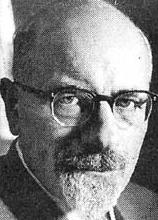A Quote by Jonathan Swift
I have heard of a man who had a mind to sell his house, and therefore carried a piece of brick in his pocket, which he shewed as a pattern to encourage purchasers.
Related Quotes
I cannot define for you what God is. I can only say that my work has proved empirically that the pattern of God exists in every man and that this pattern has at its disposal the greatest of all his energies for transformation and transfiguration of his natural being. Not only the meaning of his life but his renewal and his institutions depend on his conscious relationship with this pattern of his collective unconscious.
Any piece of knowledge which the pupil has himself acquired- any problem which he has himself solved, becomes, by virtue of the conquest, much more thoroughly his than it could else be. The preliminary activity of mind which his success implies, the concentration of thought necessary to it, and the excitement consequent on his triumph, conspire to register the facts in his memory in a way that no mere information heard from a teacher, or read in a schoolbook, can be registered.
Every one should consider himself as intrusted not only with his own conduct, but with that of others; and as accountable, not only for the duties which he neglects, or the crimes that he commits, but for that negligence and irregularity which he may encourage or inculcate. Every man, in whatever station, has, or endeavours to have his followers, admirers, and imitators, and has therefore the influence of his example to watch with care.
There is at the back of every artist’s mind something like a pattern and a type of architecture. The original quality in any man of imagination is imagery. It is a thing like the landscape of his dreams; the sort of world he would like to make or in which he would like to wander, the strange flora and fauna, his own secret planet, the sort of thing he likes to think about. This general atmosphere, and pattern or a structure of growth, governs all his creations, however varied.
D'Alembert was always surrounded by controversy. ... he was the lightning rod which drew sparks from all the foes of the philosophes. ... Unfortunately he carried this... pugnacity into his scientific research and once he had entered a controversy, he argued his cause with vigour and stubbornness. He closed his mind to the possibility that he might be wrong.
Every man is of importance to himself, and, therefore, in his own opinion, to others; and, supposing the world already acquainted with his pleasures and his pains, is perhaps the first to publish injuries or misfortunes which had never been known unless related by himself, and at which those that hear them will only laugh, for no man sympathises with the sorrows of vanity.
A man once jumped from the top floor of a burning house in which many members of his family had already perished. He managed to save his life; but as he was falling he hit a person standing down below and broke that person's legs and arms. The jumping man had no choice; yet to the man with the broken limbs he was the cause of his misfortune. If both behaved rationally, they would not become enemies.
No man can reveal to you aught but that which already lies half asleep in the dawning of your knowledge. The teacher who walks in the shadow of the temple, among his followers, gives not of his wisdom but rather of his faith and his lovingness. If he is indeed wise he does not bid you enter the house of his wisdom, but rather leads you to the threshold of your own mind.
One who was born in the house of a warrior, regardless of his rank or class, first acquaints himself with a man of military feats and achievements in loyalty....Everyone knows that if a man doesn't hold filial piety toward his own parents he would also neglect his duties toward his lord. Such a neglect means a disloyalty toward humanity. Therefore such a man doesn't deserve to be called 'samurai'.


































